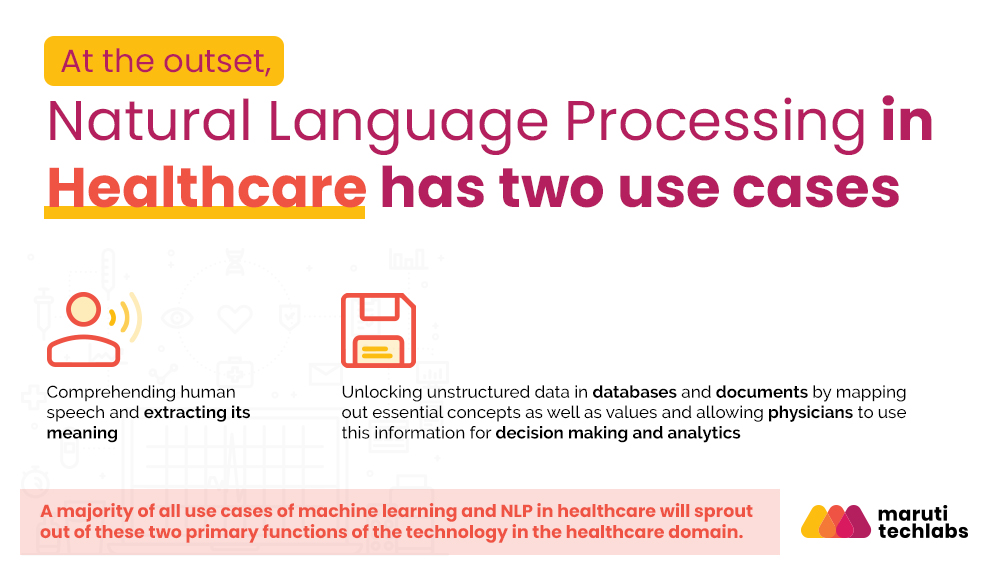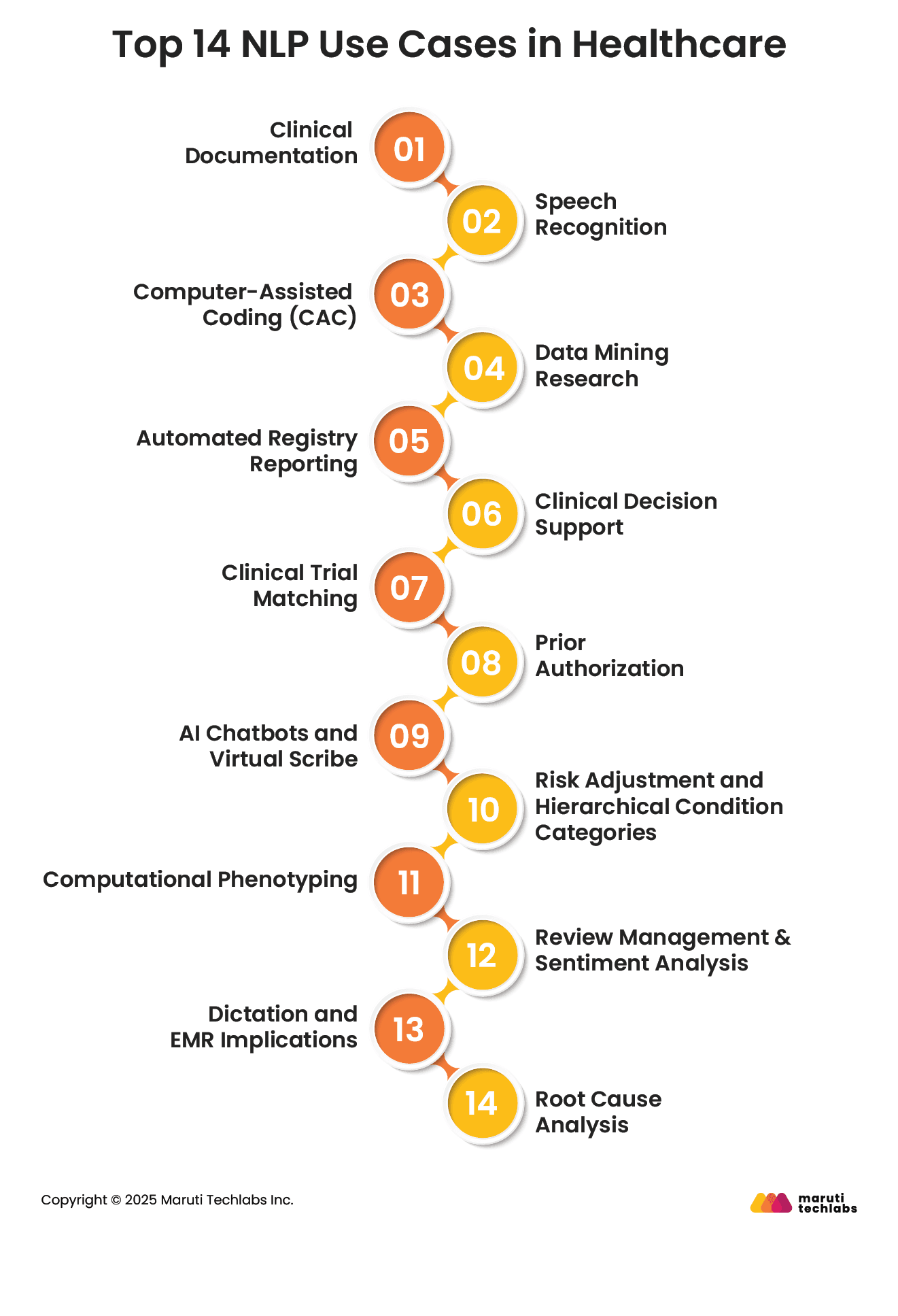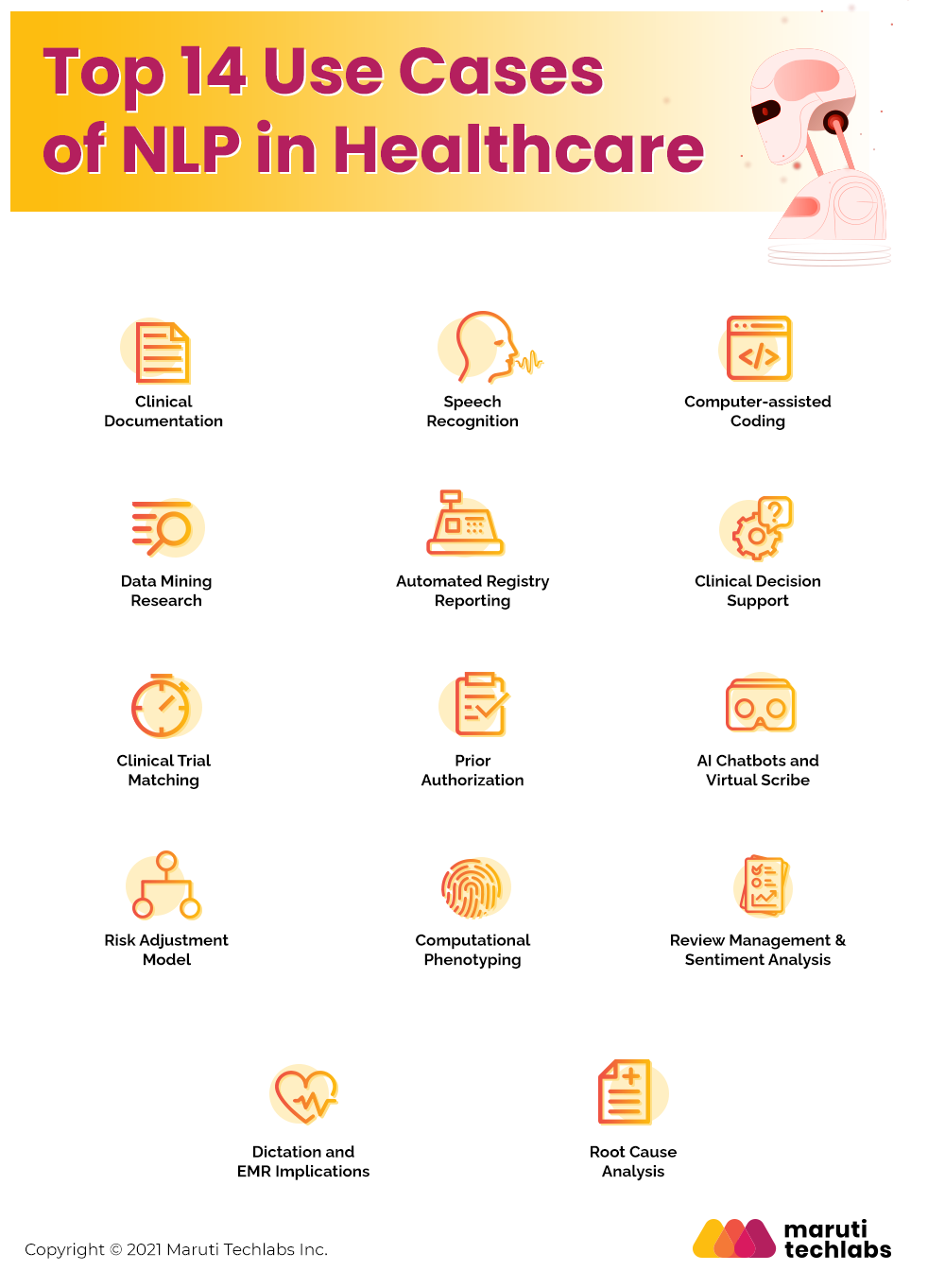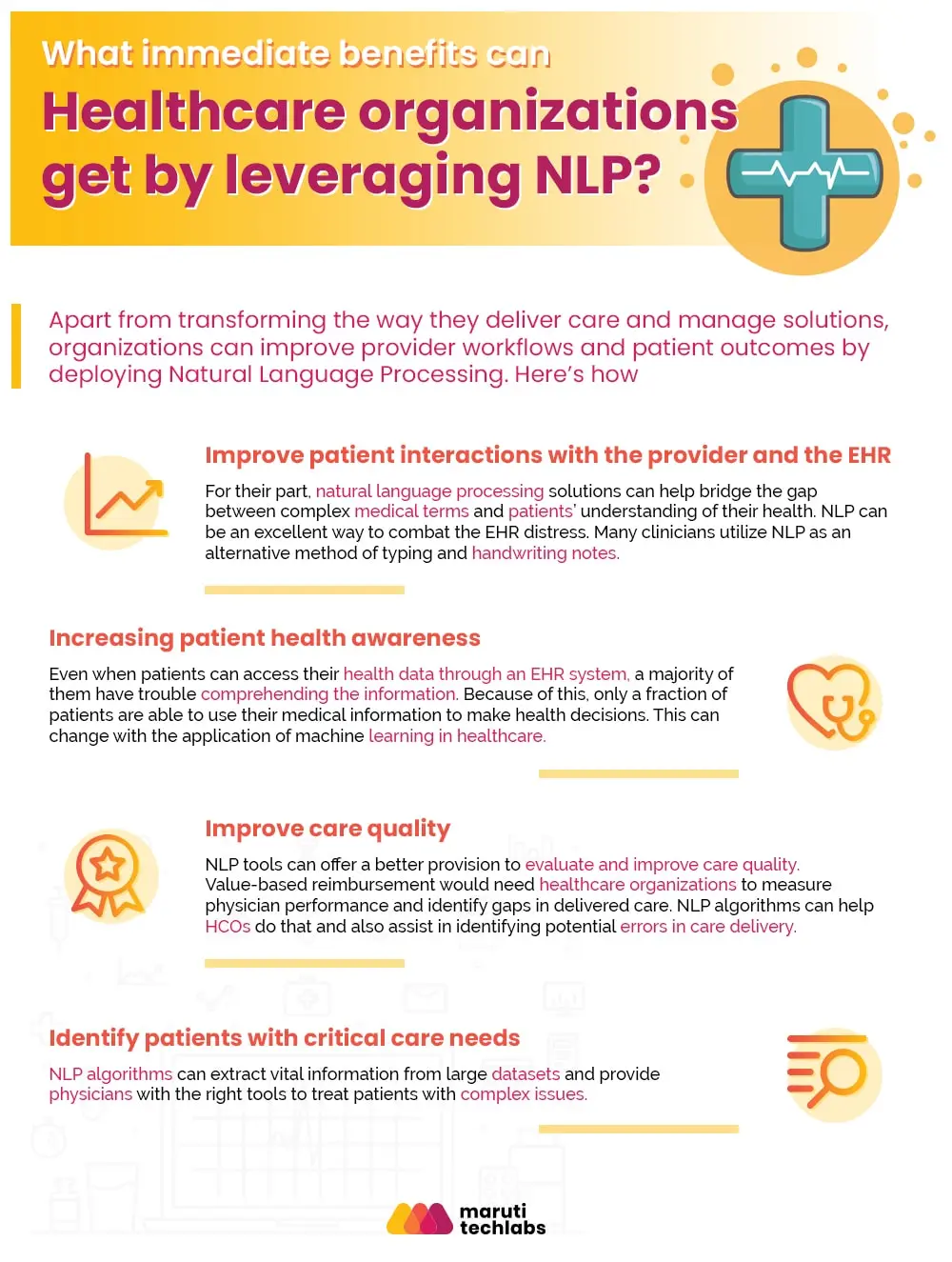

NLP in Healthcare: Top Use Cases, Projects & Real-World Examples






Natural Language Processing (NLP) is rapidly transforming the healthcare industry, enabling providers to extract actionable insights from unstructured data such as clinical notes, patient feedback, and medical literature.
This is precisely why we made a short video on the topic. It is less than 2 mins, and summarizes top 14 Use Cases of Natural Language Processing in Healthcare. We hope this helps you learn more and save your time. Cheers!
Published by MarketsandMarkets, the market size for NLP in healthcare & life sciences is expected to significantly increase from USD 5.18 billion in 2025 to USD 16.01 billion by 2030 at a CAGR of 25.3%
This surge is driven by increased digitization of medical records, AI adoption in clinical workflows, and the need to improve patient outcomes through intelligent automation. From automating administrative tasks to detecting early signs of disease through EHR analysis, NLP is empowering healthcare systems to become more efficient, accurate, and patient-centric.
In this blog, we’ll explore the top NLP use cases in healthcare, real-world implementations by leading institutions, and cutting-edge projects shaping the future of medical AI. Whether you're a provider, technologist, or researcher, these insights can help you navigate NLP’s expanding role in healthcare.
The NLP illustrates the manners in which artificial intelligence policies gather and assess unstructured data from the language of humans to extract patterns, get the meaning and thus compose feedback. This is helping the healthcare industry to make the best use of unstructured data. This technology facilitates providers to automate the managerial job, invest more time in taking care of the patients, and enrich the patient’s experience using real-time data.
However, NLP applications in healthcare go beyond understanding human language.

You will be reading more in this article about the most effective uses and role of NLP in healthcare corporations, including benchmarking patient experience, review administration and sentiment analysis, dictation and the implications of EMR, and lastly the predictive analytics.
Natural Language Processing (NLP) is increasingly being adopted across the healthcare industry, with various organizations leveraging its capabilities to enhance operations and patient care.
The adoption of NLP in healthcare is driven by the need to process unstructured data, enhance clinical decision-making, and improve operational efficiency, reflecting a significant shift towards AI-driven healthcare solutions.
Natural Language Processing is no longer just a promising concept in healthcare. It’s already delivering tangible results through innovative applications by leading organizations.
From enhancing clinical documentation to supporting diagnostic decisions, NLP is helping providers unlock insights from vast amounts of unstructured medical data.
Let’s examine how companies like Epic Systems, Nuance, Google, and IBM are making a tangible impact in healthcare with NLP-powered solutions.
Epic Systems integrates NLP into its electronic health records (EHR) platform to analyze unstructured clinical notes. This enables physicians to quickly extract key patient information, identify trends, and support decision-making.
By converting free-text data into structured insights, Epic enables healthcare providers to reduce administrative burdens and enhance care delivery efficiency across large hospital networks.
Nuance’s Dragon Medical One is a cloud-based speech recognition solution that leverages NLP to transcribe physician-patient conversations in real-time. It allows clinicians to create comprehensive clinical documentation hands-free, reducing burnout and improving accuracy.
Widely adopted in over 10,000 healthcare facilities, it’s transforming workflows by enabling faster and more efficient medical record-keeping.
Google’s Med-PaLM is an advanced large language model trained specifically on medical datasets to answer complex healthcare questions with high accuracy.
Tested by physicians, it shows potential in assisting with diagnostics, providing evidence-based recommendations, and enhancing patient education. Med-PaLM represents Google’s push to create safer, more reliable AI tools for clinical use.
IBM Watson has been deployed in oncology to help physicians develop personalized treatment plans for cancer patients. By analyzing vast amounts of medical literature, patient records, and clinical trial data, Watson provides evidence-backed recommendations.
Although facing challenges in scalability, Watson’s oncology tools have helped clinicians globally accelerate research and enhance treatment precision.
Let us have a look at the 14 use cases associated with NLP in Healthcare:
NLP healthcare systems help free clinicians from the laborious physical systems of EHRs and permits them to invest more time in the patient; this is how NLP can help doctors. Both speech-to-text dictation and formulated data entry have been a blessing. The Nuance and M*Modal consists of technology that functions in team and speech recognition technologies for getting structured data at the point of care and formalised vocabularies for future use
The NLP technologies bring out relevant data from speech recognition equipment which will considerably modify analytical data used to run VBC and PHM efforts. This has better outcomes for the clinicians. In upcoming times, it will apply NLP tools to various public data sets and social media to determine Social Determinants of Health (SDOH) and the usefulness of wellness-based policies.
NLP has matured its use case in speech recognition over the years by allowing clinicians to transcribe notes for useful EHR data entry. Front-end speech recognition eliminates the task of physicians to dictate notes instead of having to sit at a point of care, while back-end technology works to detect and correct any errors in the transcription before passing it on for human proofing.
This advancement significantly contributes to EHR NLP, optimizing electronic health records by converting spoken language into structured data.
The market is almost saturated with speech recognition technologies, but a few startups are disrupting the space with deep learning algorithms in mining applications, uncovering more extensive possibilities.

Computer-assisted coding (CAC) is one of the most famous examples of NLP applications in healthcare. This is a direct application of medical coding with NLP, where natural language processing techniques are employed to assign accurate medical codes, streamlining the billing process. CAC captures data of procedures and treatments to grasp each possible code to maximize claims. It is one of the most popular uses of NLP, but unfortunately, its adoption rate is just 30%. It has enriched the speed of coding but fell short at accuracy.
The integration of data mining, healthcare technology, and big data analytics in healthcare systems allows organizations to reduce the levels of subjectivity in decision-making and provide useful medical know-how. Once started, data mining can become a cyclic technology for knowledge discovery, which can help any HCO create a good business strategy to deliver better care to patients.
An NLP use case is to extract values as needed by each use case. Many health IT systems are burdened by regulatory reporting when measures such as ejection fraction are not stored as discrete values. For automated reporting, health systems will have to identify when an ejection fraction is documented as part of a note, and also save each value in a form that can be utilized by the organization’s analytics platform for automated registry reporting.
Automated registry reporting can be cumbersome to implement. To achieve the best possible results from the go, we recommend you seek the expertise of Natural Language Processing services.
Advancements in NLP applications in healthcare are poised to elevate clinical decision support. Nonetheless, solutions are formulated to bolster clinical decisions more acutely. There are some areas of processes, which require better strategies of supervision, e.g., medical errors.
According to a report, recent research has indicated the beneficial use of NLP for computerized infection detection. Some leading vendors are M*Modal and IBM Watson Health for NLP-powered CDS. In addition, with the help of Isabel Healthcare, NLP is aiding clinicians in diagnosis and symptom checking.
NLP applications in healthcare are making significant strides, especially in Clinical Trial Matching.
Using NLP and machines in healthcare for recognising patients for a clinical trial is a significant use case. Some companies are striving to answer the challenges in this area using Natural Language Processing in Healthcare engines for trial matching. With the latest growth, NLP can automate trial matching and make it a seamless procedure.
One of the use cases of clinical trial matching is IBM Watson Health and Inspirata, which have devoted enormous resources to utilize NLP while supporting oncology trials.

Analysis has demonstrated that payer prior authorisation requirements on medical personnel are just increasing. These demands increase practice overhead and holdup care delivery. The problem of whether payers will approve and enact compensation might not be around after a while, thanks to NLP. IBM Watson and Anthem are already up with an NLP module used by the payer’s network for deducing prior authorisation promptly.
Although no such solution exists presently, the chances are high that speech recognition apps would help humans modify clinical documentation. The perfect device for this will be something like Amazon’s Alexa or Google’s Assistant. Microsoft and Google have tied up for the pursuit of this particular objective. Well, thus, it is safe to determine that Amazon and IBM will follow suit.
Chatbots or Virtual Private assistants exist in a wide range in the current digital world, and the healthcare industry is not out of this. Presently, these assistants can capture symptoms and triage patients to the most suitable provider. New startups formulating chatbots comprise BRIGHT.MD, which has generated Smart Exam, “a virtual physician assistant” that utilises conversational NLP to gather personal health data and compare the information to evidence-based guidelines along with diagnostic suggestions for the provider.
Another “virtual therapist” started by Woebot connects patients through Facebook messenger. According to a trial, it has gained success in lowering anxiety and depression in 82% of the college students who joined in.
Hierarchical Condition Category coding, a risk adjustment model, was initially designed to predict the future care costs for patients. In value-based payment models, HCC coding will become increasingly prevalent. HCC relies on ICD-10 coding to assign risk scores to each patient. Natural language processing can help assign patients a risk factor and use their score to predict the costs of healthcare.
In many ways, the NLP is altering clinical trial matching; it even had the possible chances to help clinicians with the complicatedness of phenotyping patients for examination. For example, NLP will permit phenotypes to be defined by the patients’ current conditions instead of the knowledge of professionals.
To assess speech patterns, it may use NLP that could validate to have diagnostic potential when it comes to neurocognitive damages, for example, Alzheimer’s, dementia, or other cardiovascular or psychological disorders. Many new companies are ensuing around this case, including BeyondVerbal, which united with Mayo Clinic for recognising vocal biomarkers for coronary artery disorders. In addition, Winterlight Labs is discovering unique linguistic patterns in the language of Alzheimer’s patients.
NLP can also help healthcare organisations manage online reviews. It can gather and evaluate thousands of reviews on healthcare each day on 3rd party listings. In addition, NLP finds out PHI or Protected Health Information, profanity or further data related to HIPPA compliance. It can even rapidly examine human sentiments along with the context of their usage.
Some systems can even monitor the voice of the customer in reviews; this helps the physician get a knowledge of how patients speak about their care and can better articulate with the use of shared vocabulary. Similarly, NLP can track customers’ attitudes by understanding positive and negative terms within the review.
On average, EMR lists between 50 and 150 MB per million records, whereas the average clinical note record is almost 150 times extensive. For this, many physicians are shifting from handwritten notes to voice notes that NLP systems can quickly analyse and add to EMR systems. By doing this, the physicians can commit more time to the quality of care.
Much of the clinical notes are in amorphous form, but NLP can automatically examine those. In addition, it can extract details from diagnostic reports and physicians’ letters, ensuring that each critical information has been uploaded to the patient’s health profile.
Another exciting benefit of NLP is how predictive analysis can give the solution to prevalent health problems. Applied to NLP, vast caches of digital medical records can assist in recognising subsets of geographic regions, racial groups, or other various population sectors which confront different types of health discrepancies. The current administrative database cannot analyse socio-cultural impacts on health at such a large scale, but NLP has given way to additional exploration.
In the same way, NLP systems are used to assess unstructured response and know the root cause of patients’ difficulties or poor outcomes.
Healthcare organizations can use NLP to transform how they deliver care and manage solutions. Organizations can use machine learning in healthcare to improve provider workflows and patient outcomes.

Here is a wrap-up of the use of Natural Language Processing in healthcare:
Natural language processing solutions can help bridge the gap between complex medical terms and patients’ understanding of their health. NLP can be an excellent way to combat EHR distress. Many clinicians utilize NLP as an alternative method of typing and handwriting notes.
Most need help comprehending the information even when patients can access their health data through an EHR system. Because of this, only a fraction of patients can use their medical information to make health decisions. This can change with the application of machine learning in healthcare.
NLP tools can offer better provisions for evaluating and improving care quality. Value-based reimbursement would require healthcare organizations to measure physician performance and identify gaps in delivered care. NLP algorithms can help HCOs do that and also assist in identifying potential errors in care delivery.
NLP algorithms can extract vital information from large datasets and provide physicians with the right tools to treat complex patient issues.
A study highlighted that physicians spend as much as 49% of their time on EHRs and desk work. The same survey also revealed that they could devote only 27% of their day towards clinical patient care.
This excessive paperwork burden is touted to be a significant contributor to physician burnout. This not only takes a toll on the well-being of healthcare professionals but also profoundly impacts patient care.
Application of NLP in healthcare projects is emerging as a potential solution to this problem.
Paperwork Reduction and Increased Efficiency: NLP healthcare systems can interpret and record medical information in real-time, eliminating the need for doctors to sit down and make entries manually. This can significantly reduce the paperwork burden, increasing efficiency and allowing healthcare professionals to focus more on patient care.
Real-Time Clinical Data Analysis: Advanced NLP systems can scan vast clinical text data within seconds and extract valuable insights from piles of data. For example, an NLP medical record summarization model can analyze a patient’s medical history within seconds and generate a comprehensive summary highlighting all the essential clinical findings and previous treatments.
Computer-Assisted Coding (CAC): Another advantage of NLP is the ability of computer-assisted coding to synthesize lengthy chart notes into essential pointers. In the past, the manual review and processing of extensive stacks of chart notes from health records stretched for weeks, months, or even years. NLP-enabled systems can significantly expedite this process, accelerate the identification of crucial information, and streamline the overall workflow.
While NLP is revolutionizing healthcare, its implementation comes with significant hurdles. From data security concerns to technical complexities, these challenges must be addressed to unlock its full potential for patient care and operational efficiency.
Here are five challenges that companies face while implementing NLP.
Healthcare data is highly sensitive, making privacy and regulatory compliance critical. NLP systems must adhere to HIPAA and similar laws globally, ensuring patient information is secure during processing and storage.
Balancing innovation with stringent data protection frameworks remains a significant challenge for organizations adopting NLP solutions.
Training NLP models requires vast amounts of annotated healthcare data. However, medical texts are complex and require expert annotators, such as clinicians, making the process time-consuming and costly.
This bottleneck often delays model development and limits access to high-quality, labeled datasets, which are essential for accurate NLP applications.
Medical language varies greatly across specialties, institutions, and regions. NLP models trained on one dataset may fail to generalize to others, leading to reduced accuracy.
Developing domain-adaptive models that perform consistently across diverse healthcare settings remains an ongoing technical challenge.
Integrating NLP solutions into legacy Electronic Health Record (EHR) systems is often complex. Many EHRs lack standardization, resulting in interoperability issues and workflow disruptions.
Successful integration requires significant customization to ensure seamless data exchange and clinician adoption without adding to their administrative burden.
Medical text is often ambiguous, with shorthand, abbreviations, and context-dependent meanings. For example, “SOB” could mean “shortness of breath” or something entirely different.
NLP systems must accurately interpret such nuances to avoid critical errors in clinical decision support or documentation.
Identification of high-risk patients, as well as improvement of the diagnosis process, can be done by deploying Predictive Analytics along with Natural Language Processing in Healthcare along with predictive analytics.
It is vital for emergency departments to have complete data quickly, at hand. For example, the delay in diagnosis of Kawasaki diseases leads to critical complications in case it is omitted or mistreated in any way. As proved by scientific results, an NLP based algorithm identified at-risk patients of Kawasaki disease with a sensitivity of 93.6% and specificity of 77.5% compared to the manual review of clinician’s notes.
A set of researchers from France worked on developing another NLP based algorithm that would monitor, detect and prevent hospital-acquired infections (HAI) among patients. NLP helped in rendering unstructured data which was then used to identify early signs and intimate clinicians accordingly.

Similarly, another experiment was carried out in order to automate the identification as well as risk prediction for heart failure patients that were already hospitalized. Natural Language Processing was implemented in order to analyze free text reports from the last 24 hours, and predict the patient’s risk of hospital readmission and mortality over the time period of 30 days. At the end of the successful experiment, the algorithm performed better than expected and the model’s overall positive predictive value stood at 97.45%.
The benefits of deploying NLP can definitely be applied to other areas of interest and a myriad of algorithms can be deployed in order to pick out and predict specified conditions amongst patients.
Even though the healthcare industry at large still needs to refine its data capabilities prior to deploying NLP tools, it still has a massive potential to significantly improve care delivery as well as streamline workflows. Down the line, Natural Language Processing and other ML tools will be the key to superior clinical decision support & patient health outcomes.
As NLP technologies advance, the future of healthcare appears increasingly AI-driven, with more intelligent and intuitive systems supporting clinicians and patients alike.
Large language models (LLMs), generative AI assistants, and evolving regulations are poised to shape the integration of NLP into medical workflows and patient care. Let’s explore how these advancements will shape our future.
Large language models (LLMs) like GPT-4 and Med-PaLM are transforming how clinicians interact with patient data. These models can distill lengthy clinical notes, lab reports, and EHR data into concise, context-rich summaries.
This helps physicians focus on critical insights during consultations, improving decision-making and patient outcomes. As LLMs grow more context-aware and medically tuned, they could reduce documentation time drastically and mitigate cognitive overload for healthcare professionals.
However, ensuring accuracy and avoiding hallucinations remain critical areas of ongoing research and development.
The rise of generative AI assistants promises to redefine patient-provider interactions. Imagine virtual agents that can answer patient queries, schedule appointments, or even guide them through pre-treatment preparations using natural, conversational language.
For clinicians, these assistants could draft referral letters, discharge summaries, or patient education materials on demand. Companies like Nuance and Google are already piloting such tools, aiming to enhance productivity and free up physicians’ time for direct patient care.
The key challenge ahead lies in aligning these assistants with clinical workflows while maintaining ethical and regulatory compliance.
As NLP tools become more sophisticated and embedded in healthcare systems, regulators are stepping up to address ethical, privacy, and safety concerns.
Future regulations may mandate explainability for AI decisions, enforce stricter data anonymization protocols, and create standards for clinical AI validation. Countries like the US and EU are already drafting AI-specific healthcare policies to ensure patient safety while encouraging innovation.
Navigating this evolving regulatory landscape will be vital for healthcare organizations adopting NLP solutions, requiring close collaboration between technologists, clinicians, and policymakers.
At Maruti Techlabs, we combine deep AI/ML expertise with extensive domain knowledge in NLP to help healthcare organizations unlock the full potential of their data. Our team excels in building custom NLP solutions that transform unstructured medical information into actionable insights, streamline workflows, and improve patient outcomes.
In one notable project, we developed an NLP-powered solution for a US-based healthcare provider to automate the processing of medical records. The system extracted key data from unstructured clinical notes, enabling faster insurance claim processing and improving operational efficiency by 65%.
Our solution reduced manual effort significantly and ensured higher accuracy in data capture, setting a benchmark for scalable NLP implementation in healthcare.
We also bring robust expertise in healthcare compliance, ensuring that all our solutions align with HIPAA, GDPR, and other regulatory frameworks. This commitment enables you to deploy AI tools with confidence, knowing that patient data remains secure and compliant.
If your organization is exploring how ready it is to adopt AI-driven NLP solutions, try our AI Readiness Calculator
to evaluate your current capabilities and identify next steps for digital transformation.
Ready to revolutionize your healthcare operations? Discover Maruti Techlabs’ NLP services for processing unstructured data and AI services, driving innovation, automation, and improved patient outcomes. Partner with us to unlock the full potential of AI and NLP in healthcare.
An example of NLP in healthcare is Computer-assisted coding (CAC). It learns data on procedures and treatments to observe each possible code to maximize claims.
As medical language is often ambiguous, the meaning of written phrases and their meanings can vary in context depending on the writer. Therefore, one of the challenges of implementing NLP in healthcare is understanding the meaning and developing an opinion from clinical text.
NLP in medicine aids research by learning scientific literature for trends and insights, extracting relevant data from patient records, and improving clinical documentation.
NLP chatbots offer a more human and interactive experience for chatbots. Old-school chatbots without NLP provide a robotic and impersonal experience. Using NLP also offers benefits like automation, zero contact resolution, valuable feedback collection, and lead generation.


